Health
Nepal wanted to buy millions of jabs. Here’s how it failed
Over the past months, conflicting narratives have emerged on what went wrong in the Health Ministry that left the country without vaccines, as virus crisis deepens.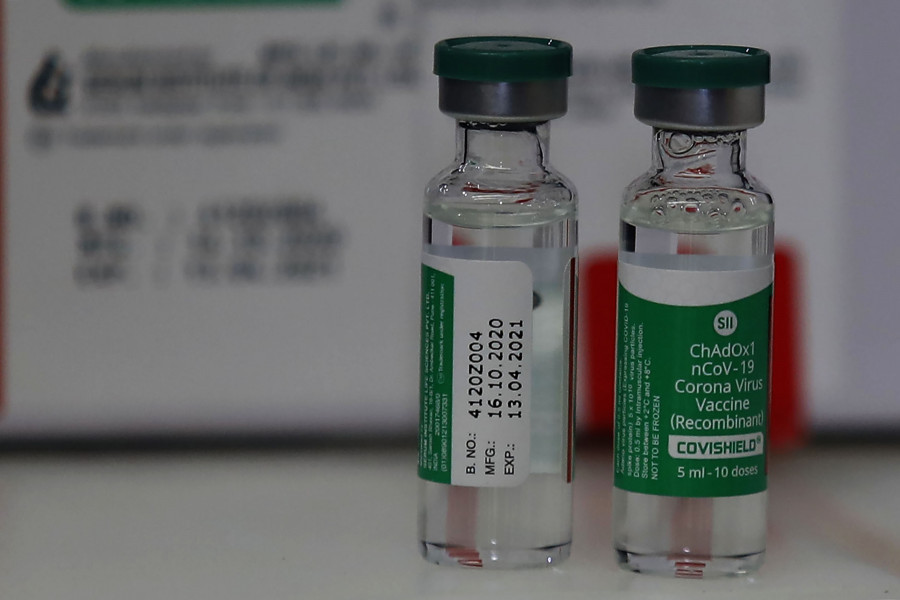
Prithvi Man Shrestha
In early March, Health Ministry officials said that the government’s plan to procure additional doses of Covishield from the Serum Institute of India was facing a glitch.
After signing a deal with the Pune-based biotechnology company for 2 million doses of vaccine at $4 per dose, the government was looking forward to bringing in an additional 5 million doses. The government, according to officials, was ready to pay $5.5 per dose for those additional vaccines.
“But we were asked to pay 10 percent extra on every dose as ‘commission’ to the manufacturer’s local agent,” an official at the Health Ministry told the Post on March 8. The official did not divulge the name of the company’s local agent.
According to the official, the ministry requested the company to sell the vaccine directly to the government and remove the commission for the agent.
“The company refused,” the official said.
The Post’s attempts to talk to officials of the Serum Institute did not succeed.
Until early March, the second wave of the virus had not hit Nepal. On March 8, the number of new cases was 89, with one death. The death toll was 3,011. The number of active cases stood at 872.
Things were not looking bleak at the time. A little less than two months earlier, Nepal, on January 27, had launched its inoculation drive with the 1 million doses of Covishield vaccine provided by India under grant assistance. On February 21, shipment of 1 million of the 2 million doses, for which the government had paid the Serum Institute, arrived. On March 7, 348,000 doses of Covishield under the World Health Organisation-backed COVAX facility landed at Tribhuvan International Airport.
Government officials said the remaining 1 million doses from India would arrive soon. It appeared as if Nepal was well ahead of many countries in the world when it came to vaccinating its citizens.
But it was not to be.
In a series of interviews with various media outlets, Health Minister Hridayesh Tripathi said the government was facing challenges in bringing in additional doses of vaccines. He attributed the delay to some local agents who wanted a commission.
***
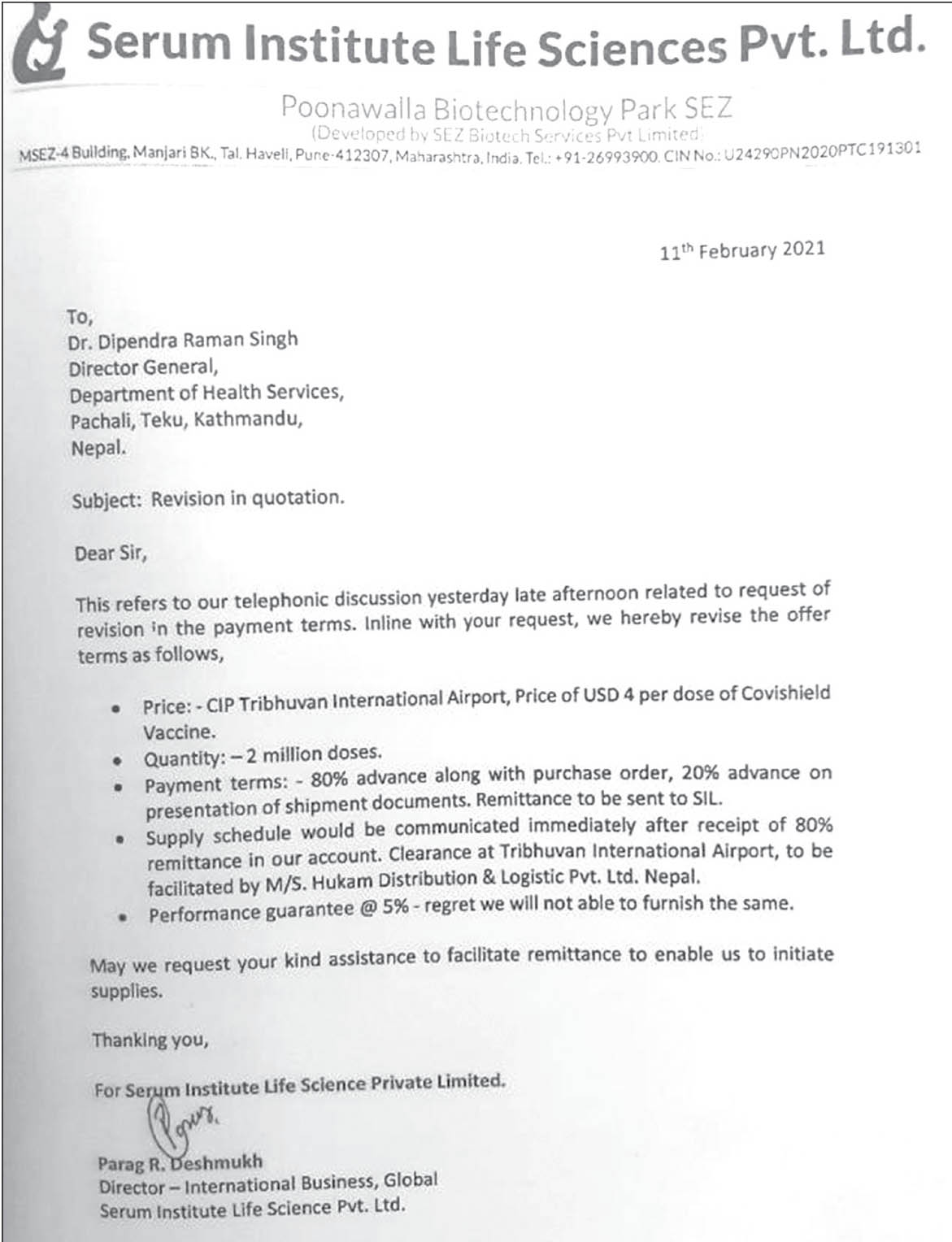
In the second week of April, Tripathi told the Post that some local agents [of the manufacturer] were seeking commissions, insinuating new vaccine consignments were not going to arrive anytime soon.
Tripathi did not reveal who the agents were.
The same evening, in an interview with Kantipur Television, Tripathi said three weeks were lost in attempts to get rid of the agents, as they started demanding commissions for the 5 million doses of vaccine the government was planning to procure.
“They are well-known people, known to everyone. They call themselves reputed commercial houses,” Tripathi told the show’s host. “We lost about three weeks to 25 days just trying to get rid of them. And just then cases started to rise in India. Those three weeks to 25 days were very crucial for us.”
According to Tripathi, in his private conversation with the manufacturer, he was informed that it was not in a position to make any new commitments.
“My understanding is these commission agents got activated and influenced everyone here and there [India],” said Tripathi. In response to the host’s question if the minister meant the “middlemen” were such powerful people, Tripathi said, “They indeed are. Middlemen are very influential… in every project.”
On April 29, Tripathi gave yet another interview to the Nepali Times.
“After the initial donation from India, we even bought 2 million doses of Covishield from the Serum Institute,” Tripathi told the Times. “We then offered to buy 5 million more. But the local agent here in Nepal of the manufacturing company asked for 10 percent in commission, forcing us to step back.”
According to Tripathi, the involvement of middlemen, who were also present when the government bought the vaccine at $4 per dose complicated the procurement for 27 days. “By then, infections began to rise in India and there were restrictions on exports,” said Tripathi.
Once again Tripathi didn’t say who the local agents, or the middlemen as he called them, were. No explanation was forthcoming why no action was initiated against “the agents” when they were blocking the vaccine import. Nor was there any reason provided why it was not made public earlier that the government was facing obstructions in its plan to procure vaccines. There was no clarity whether Tripathi had briefed Prime Minister Oli on the problems faced by his ministry in procuring the vaccines.
***
On January 26, Hukum Distribution (spelt Hukam in some instances, including its letter pad) and Logistics Pvt Ltd wrote to Dipendra Raman Singh, director general of the Department of Health Services, saying that on behalf of the Serum Institute of India, it would like to quote “special price” for 2 million doses of Covishield vaccine.
In the letter, the quoted price was $4 per dose. With 10 percent distributor margin, the total price was $4.40. Delivery schedule was–1 million in February and 1 million in March.
On February 3, a meeting was held between the government task force formed to recommend vaccine procurement and the representatives of Hukum Logistics.
Bijay Dugar and Ritu Singh Vaidya participated in the meeting representing Hukum Distribution, the authorised seller appointed by the Serum Institute of India. Government officials, including Singh, the director general of the Department of Health Services, were present in the meeting.
An agreement was reached.
Regarding payments, according to the agreement, a copy of which the Post has obtained, the government proposed 80 percent of advance payment to the manufacturer, the Serum Institute, and 20 percent after the vaccines arrive. Another proposal was to pay 20 percent with a bank guarantee and the remaining 80 percent after the consignment reached Kathmandu.
The agreement said that a deal for importing 2 million doses would be signed with Hukum Distribution on behalf of the Serum Institute, and under social responsibility, and there would not be any margin or profit. The agreement also said that Hukum Distribution would not have any financial liability. To streamline the process, the payment would be made directly to the account of the Serum Institute, said the agreement.
Subsequently, the Serum Institute revised its offer terms.
In a letter dated February 11, the Serum Institute wrote to the Department of Health Services, saying it is “revising the offer terms” as per a telephonic conversation the previous day.
The Serum Institute said in its letter, a copy of which the Post has obtained, the price of the vaccine would be $4 per dose.
The quantity mentioned was 2 million doses. The payment terms set by the manufacturer were: 80 percent advance along with purchase order and the remaining 20 percent on presentation of shipment documents. As per the deal, 1 million doses subsequently landed at Tribhuvan International Airport on February 21.
Three days after the 1 million doses arrived, Hukum Distribution again wrote a letter, a copy of which was obtained by the Post, to Singh of the Department of Health Services quoting “special price” for the 5 million doses.
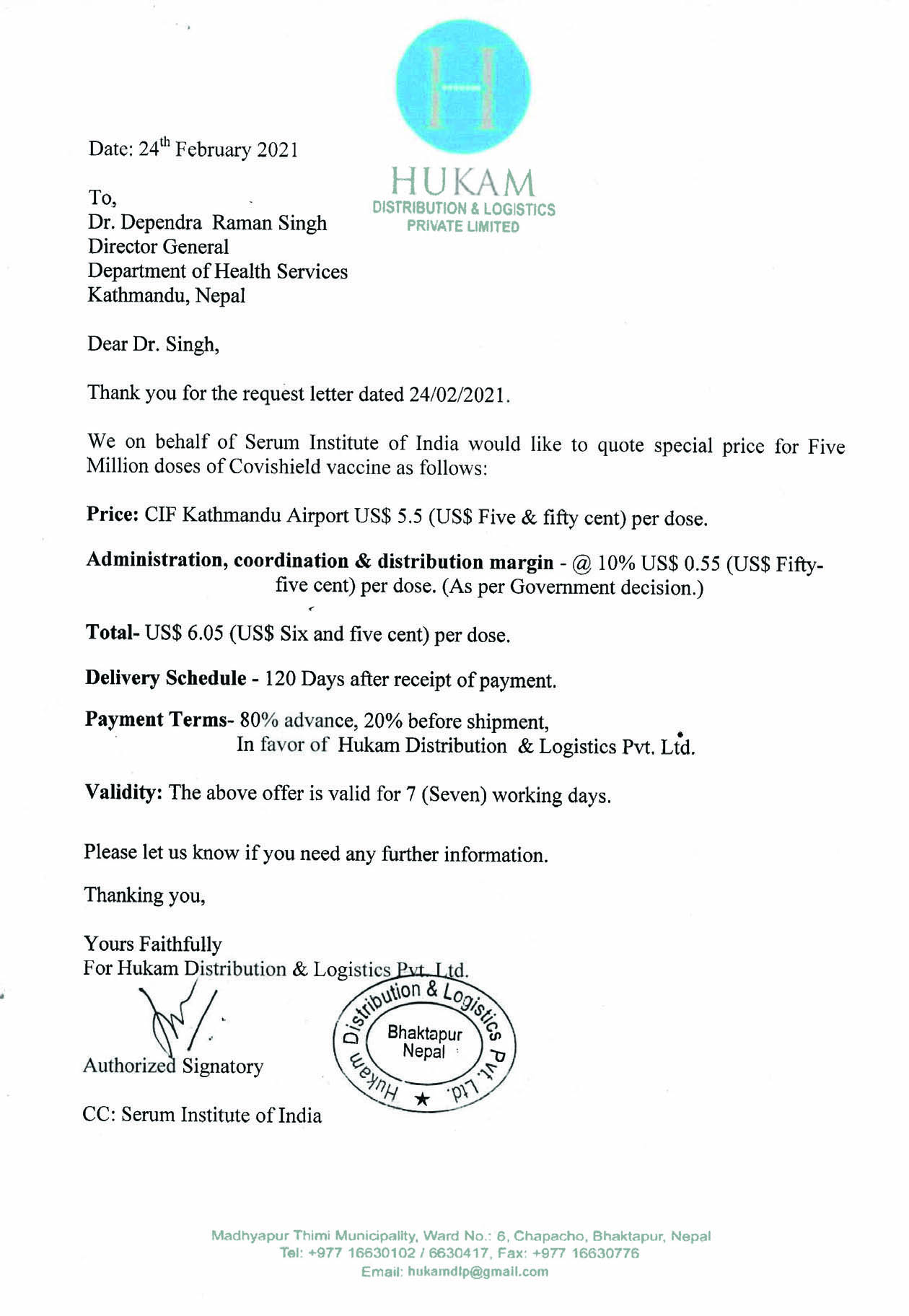
Hukum Distribution in its letter quoted its price at $5.5 per dose. It quoted 10 percent (0.55 cents) as “administration, coordination and distribution margin”. The total cost, hence, quoted by Hukum was $6.05 per dose.
The agent’s payment terms were: 80 percent advance, 20 percent before shipment, in favour of Hukum Distribution. It meant Hukum, as a local distributor, wanted the commission on the total transaction without investing a cent.
Here is where Tripathi appeared to be raising questions.
In the interview with Kantipur Television, Tripathi said the agents were looking for margins without spending a single penny. Tripathi questioned why the government should allow commission in a deal where the agent has zero investment.
Tripathi and ministry officials say the local agent did not want the government to strike a direct deal with the manufacturer.
Ritu Singh’s husband Suraj Vaidya, who is a partner in Hukum Distribution, said that their firm participated in a competitive bidding opened by the government for the procurement of five million doses.
“The government called the vaccine manufacturers to quote prices. We quoted $6.30 per dose on the behalf of the Serum Institute which is the lowest compared to other three companies from around the world,” Vaidya told the Post. “But neither the health minister nor the ministry consulted our firm regarding the procurement of five million doses.”
He said the supplier had agreed to forfeit the commission on the deal of two million doses and they were ready to make necessary concessions on the pricing if the government had consulted them.
“Even if we had quoted $9 per dose, it would be the cheapest. We understand the Covid-19 crisis in the country and we know it would be wrong to take advantage of the situation in importing vaccines,” Vaidya told the Post on Friday afternoon.
Nepal government officials, however, disputed Vaidya.
Upendra Dhungana, chief of the logistic management section at the Department of Health Services, told the Post that the government in fact had sought to procure 5 million doses directly from the Indian company without involving any agent.
“The Cabinet decision had opened the door for purchasing the vaccine in the form of either the government-to-government model, a government-to-manufacturer basis or a government-to-local agent basis. But we decided to procure the vaccine under the government-to-company model,” said Dhungana. “Under this modality, we procured two million doses. But no agreement could be signed for 5 million doses as the second wave hit India.”
According to him, the Indian company said that they would talk about 5 million doses after supplying the remaining one million doses.
“The Indian company did not ask us to deal with Hukum Distribution. It, however, had said the local distributor would facilitate the supply,” said Dhungana. “As the Cabinet has decided to purchase directly from the company, it is not true that we were prepared to buy on a competitive bidding process.”
But Serum said it does business with Nepal only through its dealer in Nepal.
“We don’t hold any direct supply right to Nepal. It is only supplied through Hukum,” Prasen Adya, the general manager of the Serum Institute, told the Post.
He refused to comment regarding the vaccine procurement deals with Nepal.
“I suggest you talk to Hukum. I am not authorised to talk to the press,” Adya told the Post over the phone. “I cannot answer on behalf of the company to the press. There is only one line of communication and people of Hukum are the right people to answer. We don’t hold any direct supply right to Nepal. It is only supplied through Hukum.”***
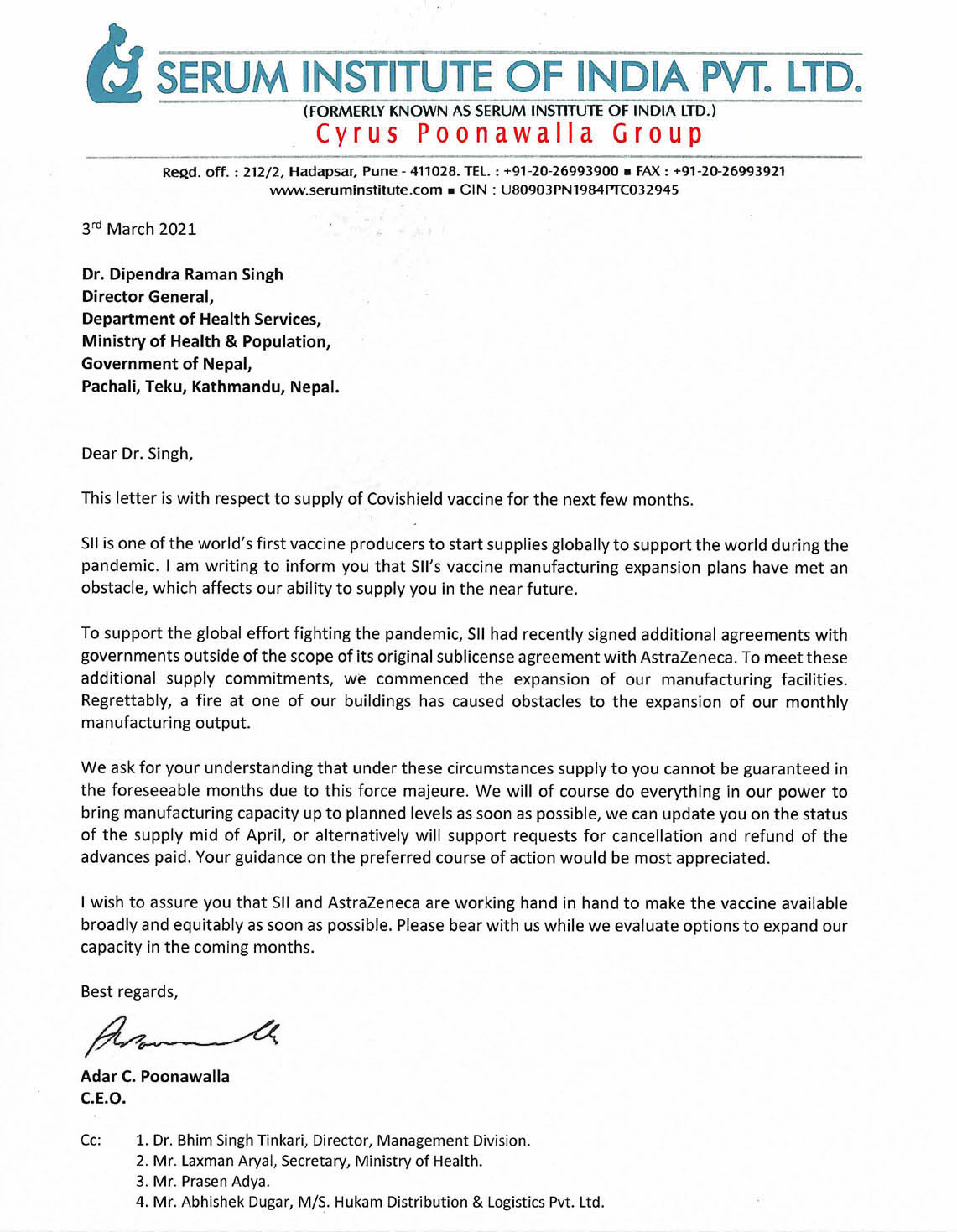
On March 3, the Serum Institute wrote to the Department of Health services about its inability to deliver the remaining consignment citing force majeure.
“SII is one of the world’s first vaccine producers to start supplies globally to support the world during the pandemic. I am writing to inform you that SII’s vaccine manufacturing expansion plans have met an obstacle, which affects our ability to supply you in the near future,” read the letter, undersigned by Adar Poonawalaa, chief executive officer of the Serum Institute of India.
The letter is copied to, among other Nepal government officials, Adya, the general manager of the Serum Institute, and Abhishek Dugar, a representative of Hukum Distribution.
“To support the global effort fighting the pandemic, SII had recently signed additional agreements with governments outside of its scope of its original sublicense agreement with AstraZaneca,” added the letter, a copy of which is obtained by the Post. “To meet these additional supply commitments, we commenced the expansion of our manufacturing facilities. Regrettably, fire at one of our buildings has caused obstacles to the expansion of our monthly manufacturing output.”
Poonawalla also offered to refund the amount the Nepal government had paid in advance.
“We ask for your understanding that under these circumstances supply to you cannot be guaranteed in the foreseeable months due to this force majeure,” said Poonawalla. “... we can update you on the status of the supply mid of April, or alternatively will support requests for cancellation and refund of the advances paid.”
****
As infection cases started to rise in Nepal in April at an exponential rate, the government scrambled for vaccines.
Questions were raised about the government’s failure to look for other options to procure vaccines. Health Minister Tripathi appeared in the media once again.
Tripathi told ekagaj.com, an online portal, on Tuesday (May 4) that he had briefed Prime Minister Oli on the situation. The news portal said Bijay Dugar and Suraj Vaidya of Hukum Distribution lobbied for commission. Their “influence” led to the abortion of the vaccine procurement plan, it reported.
On May 5, Tripathi told Naya Patrika that talks had been held with the Serum Institute for procuring 5 million doses.
“But then coronavirus cases suddenly shot up in India,” said Tripathi. “India also put a ban on exports of the vaccine. There were so many issues due to which the vaccines were not procured.”
There, however, is still no answer as to why the remaining 1 million doses were held up.
The Serum Institute in its March 3 letter to the Department of Health Services said that it would appreciate guidance on the preferred course of action.
“Your guidance on the preferred course of action would be most appreciated,” Poonawalla wrote. The Post could not confirm if the Nepal government wrote back to the Serum.
As far as the deal for 2 million doses is concerned, according to Singh of the Department of Health Services, the deal was not signed under a government-to-government basis.
“The Nepal government signed a deal with the Serum Institute. The Indian government just facilitated the deal, so that we could buy the vaccines directly from the manufacturer,” Singh told the Post. “We did not recognise the agent at the time of signing the deal for 2 million doses. We were planning to buy an additional 5 million doses also directly from the Serum Institute.”
According to Singh, if the government has to buy through a local agent, there is a different process—competitive bidding.
“And this option was open,” said Singh. “When we were planning to buy 5 million doses, the agent was not to be involved in the procurement; it, however, could facilitate the [procurement] process.”
Asked if the agent sought commission for “facilitating” the process, he said he would have to see the documents.
Just as the controversy was raging and Hukum Distribution was facing charges of stifling the entire vaccine procurement process, the Department of Drug Administration on Thursday granted permission to the same company to import Covishield, because it was the local agent of the Serum Institute.
As per the approval granted to Hukum Distribution by the drug regulator, a copy of which is seen by the Post, recipients will have to pay Rs1,709 (approx $15) per dose of Covishield.
***
The recent controversy has once against put a spotlight on Nepal’s procurement process.
According to Semant Dahal, a corporate lawyer, Nepal's Public Procurement Act has left government-to-government procurement unregulated.
“Typically, a government-to-government procurement for supply of goods to Nepal should entail an arrangement between the government of Nepal and the foreign government or its affiliated agencies, wherein the government of Nepal should be considered a purchasing entity and the foreign government or its affiliated agencies as the selling entity,” Dahal told the Post. “This [2 million doses] government-government procurement therefore does not envisage any substantive need or role for an intermediary."
Gandhi Pandit, another corporate lawyer, said it was up to the Serum Institute whether to include the “agent commission”.
“If the company agrees not to include the agent commission while signing procurement agreements, that’s okay. But this depends on negotiations between the two parties,” Pandit told the Post. “The Serum Institute may include the agent commission but may not mention it in the procurement agreement. In such a situation, there are chances that the agent could evade tax. The government can convince the Serum Institute not to include the ‘agent commission’ in pricing. If the Nepali agent gets its legal commission, it must pay tax on that.”
Rajesh Kumar Thapa, director of the Public Procurement Monitoring Office, said that even in direct purchase from the company, agents can be involved.
“The question is how we conclude the negotiation. Section 25 of the Public Procurement Act says evaluation of the bidder should be done as per criteria and method mentioned in the bidding documents,” Thapa told the Post. “In the bidding document, it should be mentioned whether to purchase goods directly from the company or through its agent. Based on the same document, evaluation should be done and procurement should be made.”
Nepal’s public procurement law does not have the provision of paying commission to the agent under any government-to-government deal.
Thapa ruled out procurement through any agent in a government-to-government deal.
“Under the government-to-government model, there is no provision of purchasing goods from a private company,” said Thapa. “But any government agency can take the goods from a private company first and hand it over to Nepal as per our legal provision regarding government-to-government deals.”
***
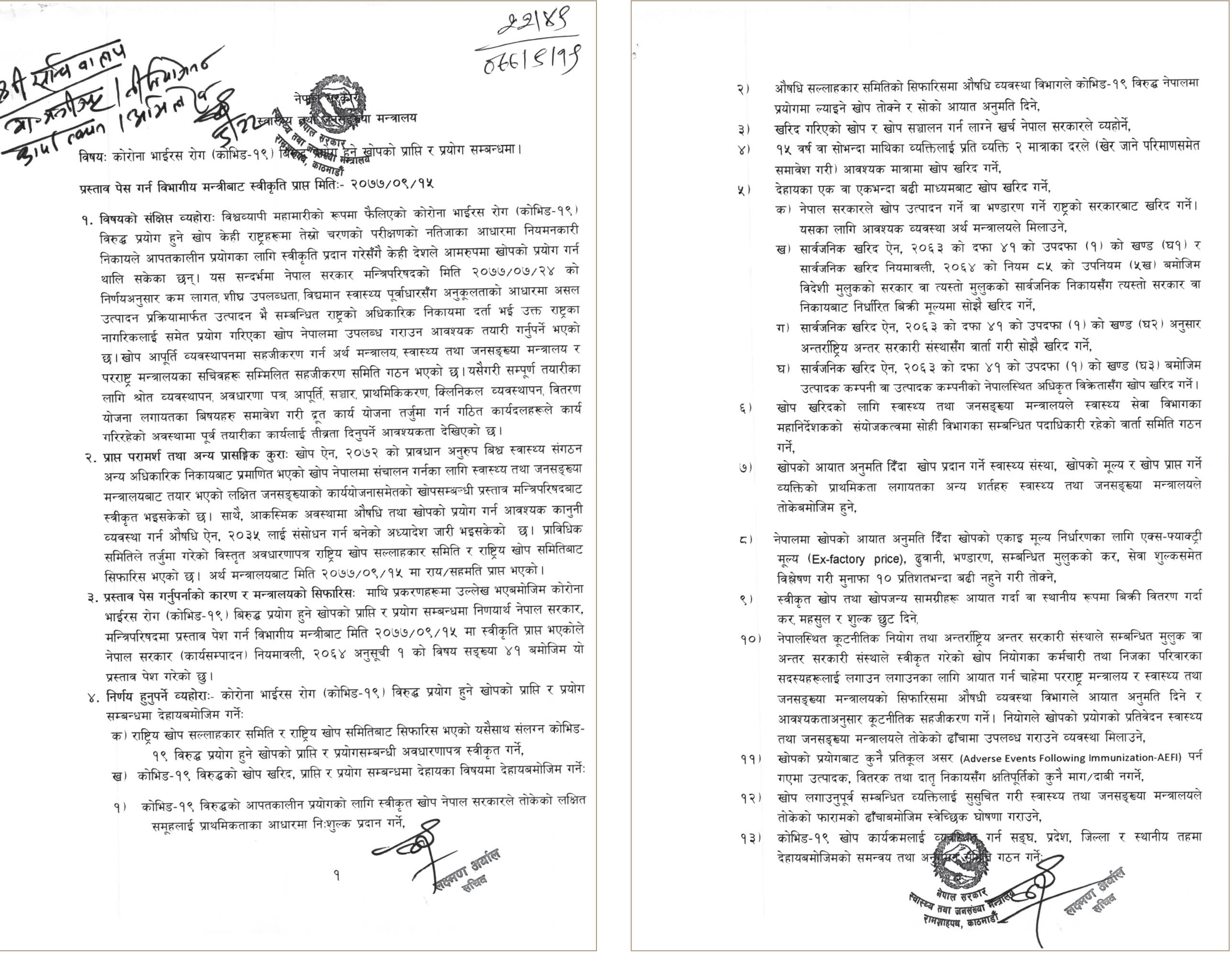
Just as the controversy over vaccine procurement was raging with Nepalis baying for the blood of those involved in blocking the import, saying they have committed a crime against humanity, the Health Ministry on Friday made a turnabout. It put out a statement saying that in the current circumstances, there is no possibility of procuring 5 million doses from the Serum Institute.
The ministry has attributed its inability to acquire the vaccines to India’s rising Covid-19 cases, the world situation, and a fire in the manufacturing company.
“The delay in the arrival of the 1 million doses of vaccine for which the government has paid was caused because the Serum Institute suffered a fire in its Pune plant,” reads the statement. “The manufacturer has committed to supplying the vaccine at the earliest. For now, there is no possibility of buying 5 million doses from the Serum Institute.”
On January 21, a fire caught an under-construction facility of the Serum Institute. But a day later, the company said the vaccine production and its supply will not be affected.
Nepal’s Health Ministry statement has also sought to clarify that the Department of Health Services “takes a decision on its own” on the vaccine procurement, hence there is no truth in media reports suggesting the involvement of Nepal government and Health Ministry.
A Health Ministry official said that the vaccine procurement was delayed purely because of some technical reasons and the unfolding situation in India rather than what has been reported of late.
“The commission was made an issue although it was to be paid by the manufacturer and not by the Nepal government,” said the official who spoke on condition of anonymity because he feared retribution. “After the deal for the 2 million doses, we were ready to pay $5.5 per dose to the Serum Institute. But the manufacturing company was not ready to provide us at less than $6.05 per dose. We requested the manufacturing company to discount the agent charge, which is $0.55 per dose. Then everything went upside down. The Covid-19 crisis started in India.”
According to the official, other countries like Bangladesh too have not received their shipments despite already transferring payments to the Serum Institute.
Of the 30 million doses Dhaka purchased from the Serum, 7 million doses were supplied in two consignments until February. The third consignment was supposed to reach in March. But it did not, forcing Bangladesh to temporarily suspend its vaccination registration, according to media reports.
The Post on Thursday repeatedly attempted to reach Health Minister Tripathi. When he finally took the phone call in the 10th attempt, he said he was tired of speaking about the vaccine procurement issue.
“Some media are reporting planted stories so I have nothing to comment,” he said.
Tripathi refused to elaborate what aspects of the story about impropriety in vaccine procurement were planted.
“You can watch my interview on TV tonight.”
Arjun Poudel, Sangam Prasain, Tika R Pradhan, Binod Ghimire and Anil Giri contributed reporting.




 23.12°C Kathmandu
23.12°C Kathmandu















